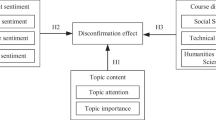Abstract
Massive Open Online Courses (MOOCs) are a popular educational format. However, it is not clear how to assess students’ experience in MOOCs. This pilot study aims to determine how the discussion of essential aspects of online education differs for students taking online courses from four different categories of education. Moreover, this study is an attempt to explore the value dimensions of the students of MOOCs – the attributes of online education experience that online learners deem most important. Using texts of student feedback it is possible to identify underlying aspects of courses students value and the difference of features and their frequency of mentioned across four fields of education.
We collected 8558 sets of feedback from students taking 37 courses on Coursera. Text mining methods – frequency analysis, keyword extraction, and dictionary construction – were used to identify the MOOCs features to which students pay the most attention.
This study identifies the dimension values of MOOCs students and distinct trends in the discussion of online learning experiences that are strictly specific to different areas.
Conducting a value analysis of MOOCs using feedback allows us to look at the features of the courses that are important for students.
Access this chapter
Tax calculation will be finalised at checkout
Purchases are for personal use only
Similar content being viewed by others
References
Annaraud, K., Singh, D.: Perceptions of hospitality faculty and students of massive open online courses (MOOCs). J. Hosp. Tour. Educ. 29, 82–90 (2017). https://doi.org/10.1080/10963758.2017.1297714
May, L., Acquaviva, K.D., Dorfman, A., Posey, L.: Medical student perceptions of self-paced, web-based electives: a descriptive study. Am. J. Distance Educ. 23, 212–223 (2009). https://doi.org/10.1080/08923640903332120
Okech, D., Barner, J., Segoshi, M., Carney, M.: MSW student experiences in online vs. face-to-face teaching formats? Soc. Work. Educ. 33, 121–134 (2014). https://doi.org/10.1080/02615479.2012.738661
Guo, Y., Barnes, S.J., Jia, Q.: Mining meaning from online ratings and reviews: tourist satisfaction analysis using latent dirichlet allocation. Tour. Manag. 59, 467–483 (2017). https://doi.org/10.1016/j.tourman.2016.09.009
Harasim, L.: Shift happens: online education as a new paradigm in learning. Internet High. Educ. 3, 41–61 (2000). https://doi.org/10.1016/S1096-7516(00)00032-4
Williams, J.: Student feedback on the experience of higher education. In: Menon, M.E., Terkla, D.G., Gibbs, P. (eds.) Using Data to Improve Higher Education: Research, Policy and Practice, pp. 67–80. SensePublishers, Rotterdam (2014). https://doi.org/10.1007/978-94-6209-794-0_5
Kember, D., Leung, D.Y.P., Kwan, K.P.: Does the use of student feedback questionnaires improve the overall quality of teaching? Assess. Eval. High. Educ. 27, 411–425 (2002). https://doi.org/10.1080/0260293022000009294
Brinko, K.T.: The practice of giving feedback to improve teaching. J. High. Educ. 64, 574–593 (1993). https://doi.org/10.1080/00221546.1993.11778449
Harvey, L.: Student Feedback [1]. Qual. High. Educ. 9, 3–20 (2003). https://doi.org/10.1080/13538320308164
Spooren, P., Brockx, B., Mortelmans, D.: On the validity of student evaluation of teaching: the state of the art. Rev. Educ. Res. 83, 598–642 (2013). https://doi.org/10.3102/0034654313496870
Grebennikov, L., Shah, M.: Commencing student experience: new insights and implications for action. Eur. J. High. Educ. 2, 267–289 (2012). https://doi.org/10.1080/21568235.2012.683663
Smithson, J., Birks, M., Harrison, G., et al.: Benchmarking for the effective use of student evaluation data. Qual. Assur. Educ. 23, 20–29 (2015). https://doi.org/10.1108/QAE-12-2013-0049
Ferguson, J.M., DeFelice, A.E.: Length of online course and student satisfaction, perceived learning, and academic performance. IRRODL 11, 73–84 (2010)
Gaebel, M.: MOOCs: Massive Open Online Courses. An Update of EUA’s First Paper (January 2013). EUA Occasional Papers (2014)
Sanford, D., Ross, D., Rosenbloom, A., Singer, D.: Course convenience, perceived learning, and course satisfaction across course formats. e-JBEST 11, 69–84 (2017)
Steyn, C., Davies, C., Sambo, A.: Eliciting student feedback for course development: the application of a qualitative course evaluation tool among business research students. Assess. Eval. High. Educ. 44, 11–24 (2019). https://doi.org/10.1080/02602938.2018.1466266
Grebennikov, L., Shah, M.: Student voice: using qualitative feedback from students to enhance their university experience. Teach. High. Educ. 18, 606–618 (2013). https://doi.org/10.1080/13562517.2013.774353
Brockx, B., Van Roy, K., Mortelmans, D.: The student as a commentator: students’ comments in student evaluations of teaching. Procedia Soc. Behav. Sci. 69, 1122–1133 (2012). https://doi.org/10.1016/j.sbspro.2012.12.042
Huxham, M., Laybourn, P., Cairncross, S., et al.: Collecting student feedback: a comparison of questionnaire and other methods. Assess. Eval. High. Educ. 33, 675–686 (2008). https://doi.org/10.1080/02602930701773000
Richardson, J.T.E.: Instruments for obtaining student feedback: a review of the literature. Assess. Eval. High. Educ. 30, 387–415 (2005). https://doi.org/10.1080/02602930500099193
Unankard, S., Nadee, W.: Topic detection for online course feedback using LDA. In: Popescu, E., Hao, T., Hsu, T.-C., Xie, H., Temperini, M., Chen, W. (eds.) SETE 2019. LNCS, vol. 11984, pp. 133–142. Springer, Cham (2020). https://doi.org/10.1007/978-3-030-38778-5_16
Luo, W., Liu, F., Liu, Z., Litman, D.: Automatic summarization of student course feedback. In: Proceedings of the 2016 Conference of the North American Chapter of the Association for Computational Linguistics: Human Language Technologies, pp. 80–85. Association for Computational Linguistics, San Diego (2016). http://dx.doi.org/10.18653/v1/N16-1010
Welch, C., Mihalcea, R.: Targeted sentiment to understand student comments. In: Proceedings of COLING 2016, the 26th International Conference on Computational Linguistics: Technical Papers, pp. 2471–2481. The COLING 2016 Organizing Committee, Osaka (2016)
Korableva, O., Durand, T., Kalimullina, O., Stepanova, I.: Studying user satisfaction with the MOOC platform interfaces using the example of coursera and open education platforms. In: Proceedings of the 2019 International Conference on Big Data and Education, pp. 26–30. Association for Computing Machinery, London (2019). https://doi.org/10.1145/3322134.3322139
Author information
Authors and Affiliations
Corresponding author
Editor information
Editors and Affiliations
Rights and permissions
Copyright information
© 2020 Springer Nature Switzerland AG
About this paper
Cite this paper
Oleshko, M., Kostrova, A., Lisyukov, R. (2020). Value Dimensions in the Reviews of the MOOCs Students. In: Alexandrov, D.A., Boukhanovsky, A.V., Chugunov, A.V., Kabanov, Y., Koltsova, O., Musabirov, I. (eds) Digital Transformation and Global Society. DTGS 2020. Communications in Computer and Information Science, vol 1242. Springer, Cham. https://doi.org/10.1007/978-3-030-65218-0_10
Download citation
DOI: https://doi.org/10.1007/978-3-030-65218-0_10
Published:
Publisher Name: Springer, Cham
Print ISBN: 978-3-030-65217-3
Online ISBN: 978-3-030-65218-0
eBook Packages: Computer ScienceComputer Science (R0)




